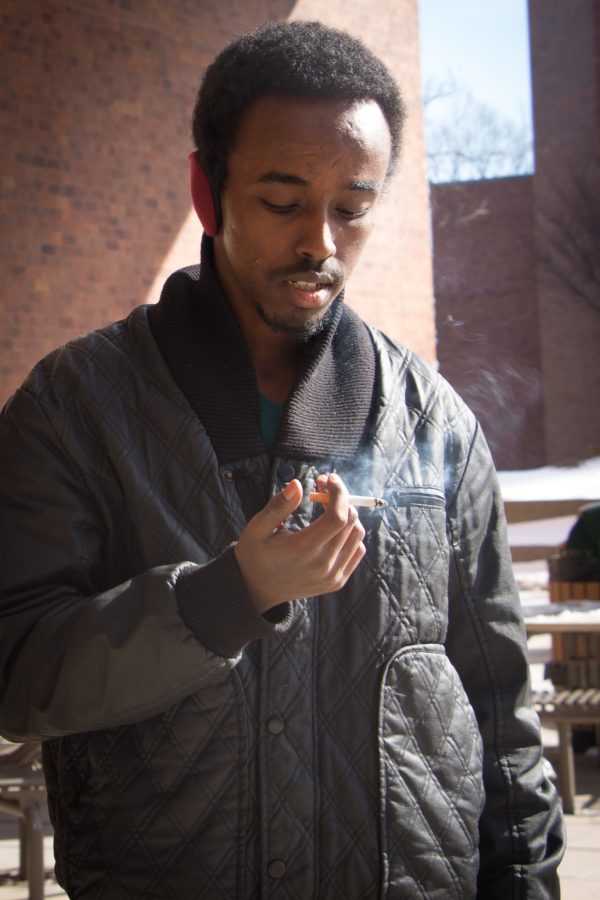Since January 19, 2016, the University of Massachusetts Boston passed a new smoking policy that prohibits the use of tobacco or nicotine anywhere on the territory of the University.
UMass Boston is the last univesity in the UMass System to adopt the policy. The main reason behind adoption of this regulation is the safety of the students and faculty on campus, which can be comprised by the unwanted exposure to secondhand smoke.
Different groups, all appointed by Chancellor J. Keith Motley, are involved with the Tobacco-Free Policy Committee, the umbrella organization ensuring the enforcement of this policy.
While it is believed that these groups represent the interests of the students, faculty, and staff, many smokers feel they’re underrepresented and claim that nobody has asked for their intake before adopting this policy.
A group of students smoking outside of the McCormack building stated that the policy will not stop anyone from smoking. They have also accused the Tobacco-Free Policy Committee of adapting the policy for the sake of advertisement: “To me it seems that it’s more of a title, more of an advertisement, ‘Come here, it’s a smoke free campus.’”
Students smoking outside the academic buildings–who wish to remain anonymous–explained that it would be an effective idea to create a designated area for smoking, thus preventing secondhand smoke exposure to non-smokers.
One of the smokers shared the story of their friend from San Jacinto College in Texas where the previous suggestion was put into practice.
“They had a big problem with people smoking, so they tried to just stop it, but it didn’t work. Then they created these spaces, that were just a little further away and now it actually works,” he continued. “I talked to my friend, and for a year now, people have just not been right by the buildings anymore, they just go to those spaces.”
When asked about this proposal, James Overton, the Interim Vice Chancellor for Student Affairs, answered with a positive, “No, It’s not going to happen.”
He explained that creating such a space would not work because this idea has been discussed with other universities and have been proven to be ineffective.
“We checked with other schools and other places, that don’t do that or have tried that, and what you get when you have smoking huts or smoking areas is what you call the creep, where you have smoking area and people go there to smoke. So, then week or two later, they’re lighting up on the way there: 20 feet away, then they’re lighting up 50 yards away, so they’re smoking all the way to that.”
Overton continued that smokers are also likely to smoke on their way back to their destination and that way the area will just keep expanding.
“Sometimes, they don’t put it out when they’re done, but they have to get back. So they smoke and the area expands, expands, and expands. It doesn’t work and you get more complaints that way.”
As oppose to the smokers by the McCormack building, Overton believes that the policy has been effective so far and it will keep being enforced with the help of approximately nine police cadets on campus.
“When you walk down the plaza comparing last semester to this semester, there is hardly anybody and the ones that we do see, we speak to them.”
In addition to asking the person smoking to put out the cigarettes, the cadets also provide them with a card that includes two pieces of information: the new policy and free consultations at the University Health Services to help them quit.
The smokers explained that when they are approached and asked put out their cigarettes, they will follow the orders. However, they continue to smoke once the cadets leave.
“We just put out the cigarettes when they come by, and continue smoking after they’re gone. You can’t stop people from smoking.”
In response to smokers’ claims about being underrepresented, Overton explained that there will be another meeting regarding the policy in April, in which all the students and parties on the Tobacco-Free Policy Committee will be asked to participate.
In addition, emails will be sent out to students, making them aware of the meeting.
“What we’re going to do, like we do with other policies on campus once a year, we’ll meet with folks to see how the policy is doing and take ideas on advisement, just see if there are any changes that need to be made. That’s going to happen at the end of April.”





















































